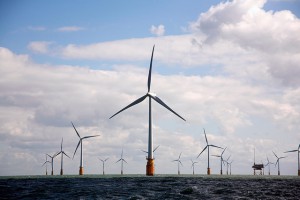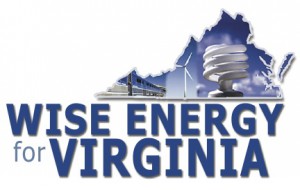Front Porch Blog
Late last week, the U.S. Department of Interior announced plans to sell leases for the development of wind energy 27 miles off of Virginia’s shores and another lease block off of Rhode Island and Massachusetts. If constructed, these would be the first offshore wind generation facilities in the United States.

September 2010: Vattenfall opened the world’s largest offshore wind farm, Thanet Offshore Wind Farm, off England’s southeast coast. Photo by Nuon
While Virginia is far from a frontrunner in the wind energy industry, or renewables in general, we have an undeniably perfect location for offshore wind. We have a unique combination of strong steady winds and shallow waters far beyond the visual horizon. Along with these physical attributes, the historically coal-focused political climate is also beginning to warm to the economic and environmental benefits of renewable energy.
In fact, both likely gubernatorial candidates – Ken Cuccinelli on the Republican side and Terry McAuliffe for the Democrats — have expressed an interest in making changes to the law that has failed to spur development of the renewable energy industry in Virginia over the past five years.
The law, which the Virginia General Assembly passed in 2007, set goals for renewable generation. However, unlike many other states, the Virginia law is voluntary and allows utilities to meet the goals by purchasing credits from out of state and/or from very old existing facilities – such as Depression-era hydropower and burning trash.
Virginia utilities quickly recognized they could buy these relatively inexpensive credits from states that do not count such antiquated sources towards their own Renewable Portfolio Standards goals and so satisfy the Commonwealth’s renewable energy goals with those sources alone. The result is that Virginia utilities took the credit — and huge bonuses amounting to tens of millions of dollars the last couple years without investing in the construction of a single new wind turbine or solar panel in Virginia.

As groups across the political spectrum continue to point out the weaknesses in the law, there is a growing
demand for change. Obviously, not everyone agrees on each detail, but there is consensus that investors
would be more likely to fund projects if the goals were mandatory, and that politicians would be more
likely to support reform if it would create job growth right here in Virginia.
With this announcement from the federal government and the statements of our 2013 gubernatorial candidates, Virginia has never had a better shot at getting renewable energy and bringing the benefits home to Virginians.
PREVIOUS
NEXT
Related News

Leave a comment
Your email address will not be published. Required fields are marked *
